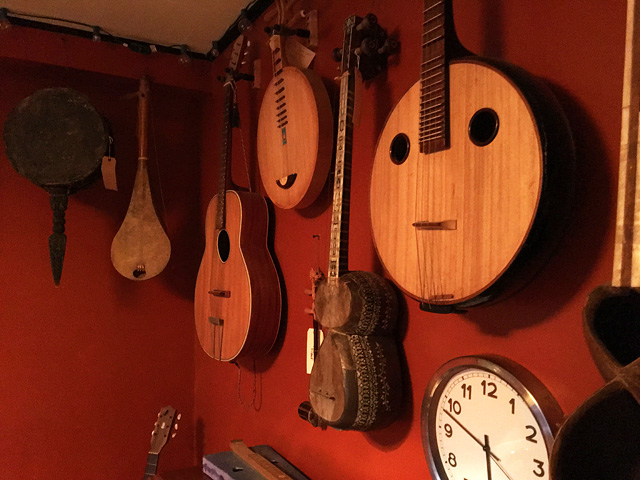The Jalopy Theater
By John Breece
The Jalopy Theater and School of Music sits in a simple brick row house at the end of Columbia Street, a stone’s throw away from the busy entrance to the Battery Tunnel in Red Hook, Brooklyn. The red doors give way to a performance space, a dance floor, a traditional instrument shop and a bar. But the families with children aged six to 14 are gathered here this afternoon for the learning of old time traditional music.
Fiddles, guitars, banjos, mandolins and more fiddles. They learn the musical traditions in songs that that are hundreds of years old and stretch back to the first settlers in Appalachia and beyond that to the British Isles. For two hours every Wednesday for the course’s nine weeks they are taught in group ensembles and small instrument focused groups. They learn the old songs by singing and playing together.
Lynette and Geoff Wiley established the Jalopy Theater 12 years ago, coming from Chicago to start their musical enterprise in this modest corner of Brooklyn. Six nights a week they have national and local acts playing every conceivable form of folk music – from the scratchy unadorned simplicity of the Down Hill Strugglers based in New York to a Serbian Choir passing through on worldwide tours.
But during the daylight hours the place is alive with families with young children there for the classes. The Jalopy Jr. Folk School is for kids 6 to 14 and there is a Making Music program for children aged six to nine. According to Lynette Wiley, some 75 students have passed through the program since it started some four and a half years ago.
The music these young New York players are learning is raw and primitive and can portray a dark side of the human experience, with tales of betrayal and lost love and long hard lives of suffering. Through the decades players have adapted these songs for their own times and circumstances and the kids in the Jalopy program are no different. Lynette Wiley says that while the source material can be pretty dark, “The kids will sometimes change the lyrics to something more age appropriate.” So instead of the traditional murder ballads the kids make the songs their own.

Wiley is proud of the musical community she and her husband have forged in Red Hook. “The fact that the young people are coming to a two-hour program, they’re really establishing ongoing relationships with each other and the instructors.” And the experience involves the whole family. “The parents have formed an incredibly tight community. Almost all of them will eat dinner together tonight after the class, all the kids and all the parents.” They eat next door at the Jalopy Tavern, a restaurant and bar the Wileys also own and operate. “It’s become a pretty important part of the family week,” she says. “It’s pretty darn special.”
The musical director of the program is banjoist Hilary Hawke of the roots band Dubl Handi who has been teaching at Jalopy for seven years and has many years experience in coaching the twang out of little banjo players and their older contemporaries alike. “We do everything based on traditional music,” she says. Her vision for the program is singing and playing based. She can be found all over during the course of any given session, instructing or playing along on banjo, guitar, fiddle or just belting out the melody and harmony parts of the songs.
Hawke says that the students work on five songs per session and they have a set of 25 songs or so at this point in the course. All their work will pay off in a showcase involving a dress rehearsal, show and a square dance afterwards at the end of the course. Hawke says she likes to focus on learning the songs of a specific old time group like Skillet Lickers or The Carter Family to integrate some of the long history behind the music into the kids’ learning. “To me it’s exposing them to music they wouldn’t get to hear till later on. It’s really cool – we’re creating the new folkies”
Lynette Wiley likes the diversity of ages and abilities in the program. “There are so many mixed learners,” she says. “The Jalopy approach is community learning, song-based fun. We’re not drilling scales. That’s just not what we’re doing. We’re coming together and learning in a more organic way.” Wiley says it’s all about community and embracing a community-forward approach to spreading the music she loves. “The fact that you get to play in an ensemble for this much of your time is I think a great way for people to learn. It’s an really important way for people to love what they’re doing instead it being in a vacuum.”
Saved under Entertainment, Featured Slide, Multimedia
